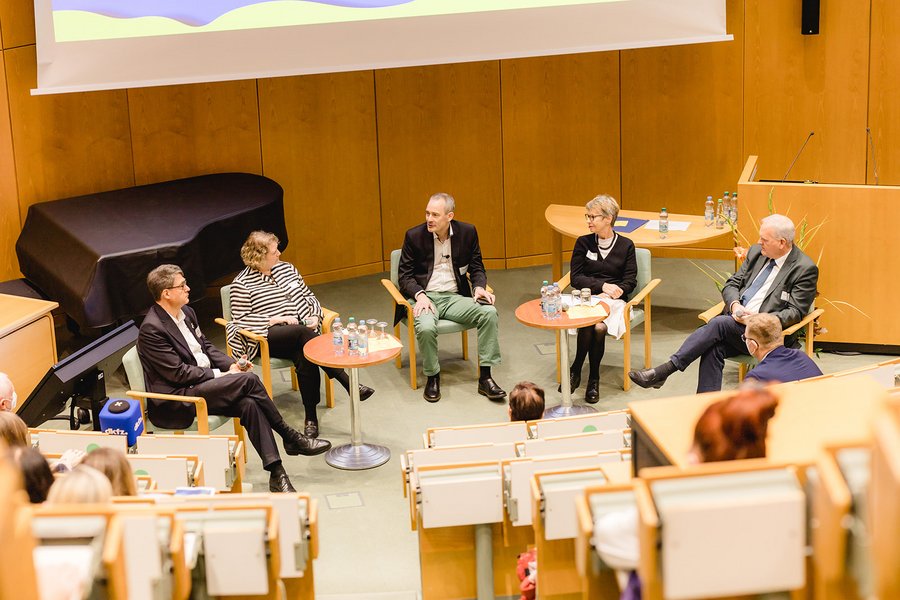First National Conference Patients as Partners in Cancer Research at DKFZ

From September 30 to October 2, 2022, the first national conference Patients as Partners in Cancer Research took place. The event was organized by patient representatives and held at the German Cancer Research Center (DKFZ). Under the motto "Learn. Cooperate. Change", the participant discussed how patient participation in cancer research can be promoted.
The perspectives of cancer patients are often already taken into account in health care, for example by self-help representatives or patient advisory councils in hospitals. In cancer research, the systematic involvement of those affected is still in its infancy. It is therefore an important goal of the National Decade against Cancer, which was proclaimed by the Federal Ministry of Education and Research (BMBF) at the beginning of 2019, to involve patients in all phases of oncological research.
The nationwide conference "Patients as Partners in Cancer Research," which took place for the first time this year at DKFZ, is intended to help further integrate the patient perspective in cancer research. The event was aimed at representatives from self-help and patient organizations and aimed to deepen knowledge and promote exchange.
Bettina Stark-Watzinger, Federal Minister of Education and Research, opened the conference with a video message. In her welcome speech, she said: "In the fight against cancer, research is the most powerful tool we have. We have been fighting this battle for a long time and we are learning every day. But what officially begins today with this conference is something of a new era."
Markus Wartenberg, Deputy Chairman of the German Sarcoma Foundation and spokesperson for the interim NCT National Patient Advisory Board, together with Bernd Crusius, Managing Director oft he „Haus der Krebs-Selbsthilfe - Bundesverband e.V.“, gave an overview of self-help and patient participation in Germany. Markus Wartenberg made it clear: "Patients with their unique expertise should be partners at eye level. Patient participation must be a matter of course in all phases of research." Clinical trials are of great importance in this context, as they provide patients with rapid access to advances in cancer research. Bernd Crusius emphasized: "Patients have to be be involved right from the design and development of clinical trials. The focus should be on patient-oriented language, study registries that laypeople can understand and easy access." In particular, the potential of non-commercial, science-driven clinical trials (Investigator Initiated Trials) has not been exhausted, although these usually raise very relevant questions from a patient and care perspective.
New structures are needed so that those affected can participate in cancer research. Therefore, in 2018, the DKFZ was the first research institution in Germany to establish a Patient Advisory Boardl for Cancer Research.
Michael Baumann, Scientific Director and Chairman of the Board of Management of DKFZ, and Rudolf Hauke, Chairman of the DKFZ Patient Advisory Board, said, "By establishing the Patient Advisory Board for Cancer Research, DKFZ has taken on a pioneering role. But beyond that, it is also necessary to expand patient participation in Germany. To do this, we have firmly implemented the partnership between patients and researchers in the concept for the expanded National Center for Tumor Diseases (NCT). Because the perspective of patients makes research better. And better research leads to better opportunities in the prevention, early detection, diagnosis and treatment of cancer. We are pleased that our 2017/18 initiative has now gained so much momentum and that we are on our way to ensuring that patient participation becomes the new normal in cancer research as well. This first conference makes a decisive contribution to this."
The conference offered a diverse program over three days: panel discussions provided insights into cancer research in Germany. Lectures went into further aspects and showed specifically how how patients can get involved, for example in the review of research proposals. The conference was rounded off by seminars on personal skills, such as language and presentation techniques. A joint networking dinner provided an opportunity for exchange.







